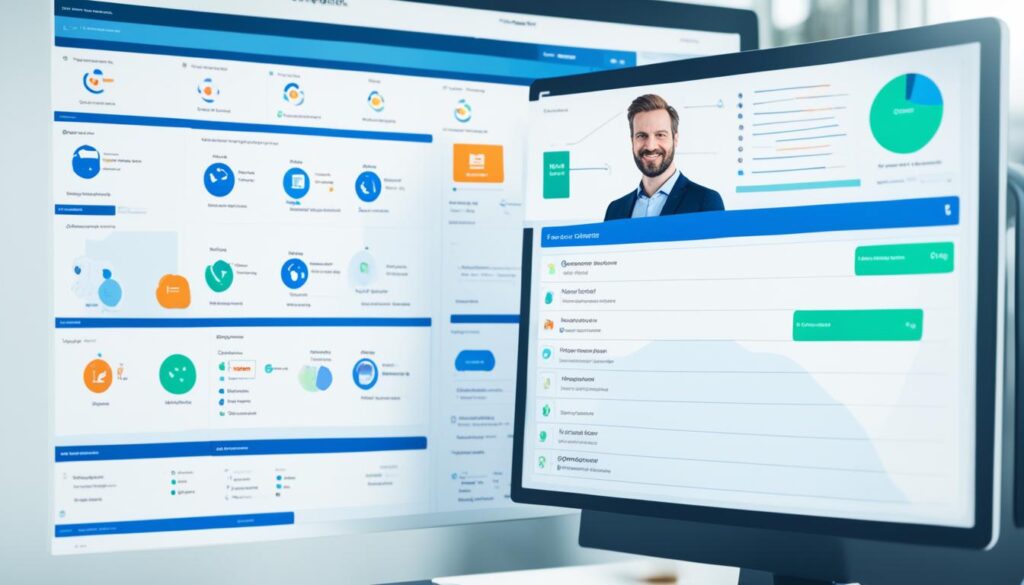Customer relationship management (CRM) software is a powerful tool that can revolutionize your customer service operations. But do you know how to make the most of it? Are you truly leveraging its full potential?
In this article, we will delve into the world of CRM for customer service, exploring the key features that can help you elevate your customer support game. From efficient case management to seamless communication tools, CRM offers a plethora of benefits that can transform how you engage with your customers.
So, if you want to unlock the true potential of your customer service efforts, keep reading. We’re about to reveal the secrets of using CRM software to your advantage and enhancing your customer service experience like never before.
Why Use a CRM for Customer Service?
Using a CRM for customer service offers numerous benefits that can greatly improve your business operations. By leveraging the power of CRM software, you can enhance customer satisfaction, boost your business efficiency, and drive overall success.
Improved Customer Satisfaction
With a CRM, you can track and manage customer interactions effectively. This allows you to provide personalized and transparent communication, creating a positive customer experience. By understanding your customers’ preferences, needs, and history, you can tailor your customer service to meet their expectations, leading to higher satisfaction levels.
Boosted Business Efficiency
A CRM system provides a centralized platform for managing customer data, inquiries, and issues. This streamlines your customer service processes, enabling you to resolve problems more effectively and efficiently. By automating routine tasks, such as case routing and response management, you can free up time for your team to focus on more high-value activities.
“A CRM system allows you to track customer interactions, personalize communication, and resolve issues effectively, resulting in improved customer satisfaction and increased business efficiency.”
Increased Sales and Customer Loyalty
By leveraging the customer insights and data stored in your CRM, you can better understand your customers’ buying behavior and preferences. This knowledge allows you to identify upsell and cross-sell opportunities, leading to increased sales. In addition, resolving issues promptly and providing exceptional customer service fosters customer loyalty, leading to repeat business and positive word-of-mouth referrals.
To summarize, utilizing a CRM for customer service offers tangible benefits for your business. It improves customer satisfaction, boosts your business efficiency, and ultimately drives growth and success.

Selecting the Right CRM for Customer Service
When it comes to customer service operations, choosing the right CRM is crucial for providing efficient and satisfactory support to your customers. A customer service CRM should offer features specifically designed to assist and satisfy customers, ensuring a seamless experience from start to finish.
Here are some key CRM features to consider for customer support:
- Automated Case Routing: This feature enables automatic assignment of customer support cases to the most appropriate team member, ensuring timely and efficient resolution.
- Knowledge Articles: A CRM with a knowledge base feature allows you to create and store informative articles to help both your support team and customers find answers quickly.
- FAQ Pages: Having an FAQ section within your CRM provides customers with easily accessible self-service resources, reducing the need for direct support interaction.
- Integrated Payment Processing: Streamline the payment process by integrating payment processing capabilities directly into your CRM, enabling smooth and secure transactions.
- Multichannel Communication Tools: Choose a CRM that supports various communication channels, such as phone, email, live chat, and social media, allowing customers to reach out through their preferred method.
When considering different CRM software options, there are several reputable choices available:
- Salesforce Essentials: Salesforce Essentials is a popular CRM solution known for its robust customer service features, including case management and omni-channel support.
- HubSpot: HubSpot offers a comprehensive CRM platform with integrated customer service tools, helping businesses efficiently manage customer interactions and deliver personalized support.
- Bitrix24: Bitrix24 is an all-in-one CRM system that provides customer service features like ticketing, email integration, and task automation, making it a versatile option for businesses of all sizes.
By carefully evaluating CRM features and software options, you can choose a customer service CRM that aligns with your specific needs and empowers your support team to deliver exceptional service.

Setting Up and Customizing Your CRM for Customer Service
Once you have chosen a CRM for your customer service needs, it’s time to set it up and customize it to maximize its effectiveness. This involves adding your customer service users to the CRM system and assigning them the appropriate roles and permissions.
Adding users to your CRM allows you to grant access to specific individuals who will be responsible for handling customer service inquiries and support requests. By giving them access to the CRM, they can efficiently manage and resolve customer issues, ensuring a seamless customer experience.
In addition, assigning roles and permissions within the CRM is crucial to maintain data security and control. By assigning different roles to your team members, such as administrators, managers, and agents, you can control their level of access to sensitive customer data. This ensures that only authorized personnel have access to confidential information, protecting your customers’ privacy.
Automating CRM processes is another key aspect of customizing your CRM for customer service. By automating repetitive tasks, such as ticket creation, assignment, and follow-up emails, you can streamline your customer service operations and save valuable time. Automation also helps reduce the risk of human error and ensures that essential customer interactions are not missed.
Here is an example of how you can set up roles and permissions in your CRM:
| Role | Permissions |
|---|---|
| Administrator | Access to all CRM features and settings |
| Manager | Access to customer data, reporting, and team performance metrics |
| Agent | Access to customer interactions, ticket management, and communication tools |
By assigning the appropriate roles and permissions, you can ensure that each team member has the necessary tools and access levels to perform their job effectively.
Automating CRM processes is beneficial in multiple ways. It eliminates repetitive tasks, reduces manual errors, and allows your team to focus on more meaningful and complex customer interactions. Here is an example of how you can automate CRM processes:
- Automatically assign incoming customer service tickets to available agents based on workload or skill set.
- Set up automated email notifications to keep customers informed about the status of their requests.
- Use workflow automation to escalate urgent or high-priority tickets to designated team members.
Automating these processes can help streamline your customer service operations, resulting in faster response times and improved customer satisfaction.
To summarize, setting up and customizing your CRM for customer service involves adding users, assigning roles and permissions, and automating CRM processes. By carefully configuring your CRM to align with your specific customer service requirements, you can enhance productivity, improve data security, and deliver exceptional customer experiences.

Integrating Your CRM with Third-Party Tools
While CRM systems offer built-in customer service and support features, integrating with third-party tools can take your system functionality to the next level. By integrating your CRM with various third-party tools, you can centralize operations and enhance your customer service capabilities.
One example of integration is with payment processing solutions like Stripe or Authorize.net. By integrating your CRM with these tools, you can streamline customer payment handling and provide a seamless checkout experience.
Another important integration is with communication tools like Mailchimp. Integrating your CRM with Mailchimp allows you to improve customer relationships through targeted email campaigns and personalized communication.
When exploring third-party integrations for your CRM, it’s essential to consider the tools that are relevant to your specific customer service needs. By integrating with the right tools, you can enhance your CRM’s functionality, centralize your operations, and deliver an exceptional customer service experience.
| Third-Party Integration | Functionality |
|---|---|
| Payment Processing Solutions (e.g., Stripe, Authorize.net) | Simplify customer payment handling and streamline checkout processes. |
| Communication Tools (e.g., Mailchimp) | Improve customer relationships through targeted email campaigns and personalized communication. |
Leveraging Customer Data in Your CRM
One of the key benefits of using a CRM for customer service is the ability to manage and utilize customer data. By effectively managing customer data in your CRM system, you can enhance your understanding of individual customers and personalize the service you provide.
CRM systems allow you to store and update essential customer information, including contact details, purchase history, and preferences. With this data readily available, you can deliver a more tailored and efficient customer experience. By utilizing customer information, you can personalize your interactions, meet specific needs, and make relevant recommendations to enhance customer satisfaction.
The Power of Personalizing Customer Service
When you personalize customer service based on the available customer data, you create a more meaningful and engaging experience. By understanding customer preferences, you can anticipate their needs and provide proactive support. For example, if a customer has previously expressed interest in a particular product, you can reach out to offer them exclusive updates or discounts related to that product.
Personalization extends beyond addressing customers by their names. It also involves tailoring your communication channels to their preferred methods, sending targeted email campaigns, or providing recommendations based on their purchase history. The more personalized the service, the more likely you are to build strong, long-term relationships with your customers.
“Personalization is not just about addressing customers by their names. It involves tailoring your communication channels to their preferred methods and providing recommendations based on their purchase history.”
Optimizing Customer Interactions with CRM Data
In addition to personalizing customer service, CRM data can optimize your customer interactions. By analyzing customer activity history, you can identify trends, pain points, and opportunities for improvement. For example, if you notice that many customers encounter difficulties while using a specific feature of your product, you can proactively address the issue, provide support materials, or even modify the feature to enhance user experience.
With CRM data, you can also prioritize customer inquiries and requests based on their importance or urgency, ensuring that you provide timely and efficient responses. This not only improves customer satisfaction but also streamlines your internal processes, allowing your customer service team to work more effectively and deliver exceptional service.
The Power of Data-Driven Insights
Data-driven insights provide valuable information that can guide your business decisions and strategies. By analyzing customer data within your CRM, you can identify patterns, preferences, and trends that can inform your marketing campaigns, product development, and overall customer service strategies. This allows you to align your efforts with your customers’ needs and expectations, ultimately driving business growth and customer loyalty.
For instance, you may uncover that a specific customer segment prefers a certain type of communication channel or responds positively to personalized offers. Armed with this knowledge, you can fine-tune your strategies to better engage and serve these customers, resulting in improved customer satisfaction and increased conversion rates.
By leveraging customer data in your CRM, you can unlock valuable insights, personalize customer service, and optimize customer interactions. This data-driven approach enables you to build stronger relationships with your customers, enhance their overall experience, and drive business success.
Conclusion
By utilizing a CRM for customer service, you can significantly improve your business efficiency and enhance customer satisfaction. With the right CRM system, effective setup, and utilization of customer data, you can provide exceptional customer service and foster long-lasting relationships with your clients.
The benefits of using a CRM for customer service are numerous. It enables improved communication with customers, allowing for personalized and transparent interactions. The ability to access complete customer profiles, including their history, preferences, and needs, enables a more tailored customer service experience, ultimately leading to higher customer satisfaction.
Additionally, integrating a CRM into your customer service operations can boost productivity by streamlining processes and resolving customer issues more efficiently. It also provides valuable insights and analytics that can help drive sales growth and improve overall business performance in today’s highly competitive market.
In conclusion, incorporating a CRM into your customer service strategy can yield significant advantages for your business. From better communication and enhanced productivity to increased sales and improved issue resolution, a CRM can empower your customer service team to deliver exceptional support and ensure customer loyalty.
FAQ
What are the benefits of using a CRM for customer service?
Using a CRM for customer service allows businesses to track customer interactions, personalize communication, provide tailored customer service experiences, increase productivity, resolve issues more effectively, and ultimately boost sales and customer loyalty.
How do I choose the right CRM for customer service?
When selecting a CRM for customer service, consider features like automated case routing, knowledge articles, FAQ pages, integrated payment processing, and multichannel communication tools. Some popular CRM software options include Salesforce Essentials, HubSpot, and Bitrix24.
How do I set up and customize my CRM for customer service?
To set up and customize your CRM for customer service, add customer service users to the system and assign their roles and permissions. It’s crucial to ensure users have the appropriate access for their job roles. Additionally, automate CRM processes to streamline operations and improve efficiency.
Can I integrate my CRM with third-party tools?
Yes, integrating your CRM with third-party tools can enhance system functionality and centralize various operations. For example, integrating with payment processing solutions like Stripe or Authorize.net simplifies customer payment handling. Integration with communication tools like Mailchimp improves customer relationships through email campaigns.
How can I leverage customer data in my CRM for better customer service?
Managing customer data in your CRM allows for easy access to customer profiles, activity history, ticket requests, and more. Utilize this data to personalize customer service, provide relevant recommendations, and deliver a more tailored and efficient customer experience.
What benefits does using a CRM for customer service provide?
Using a CRM for customer service enhances communication, boosts productivity, increases sales, resolves customer issues more efficiently, and helps businesses stay ahead in today’s competitive market.
